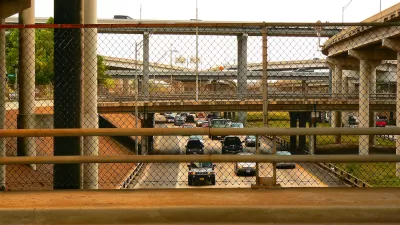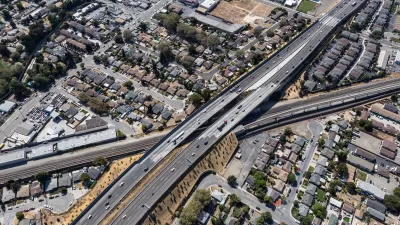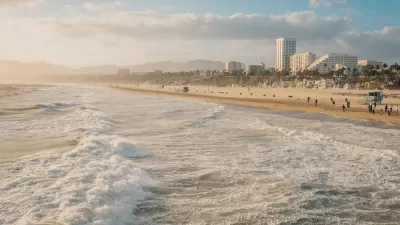Despite calls to center equity in infrastructure projects, highway construction and expansion still disproportionately impacts communities of color, according to a Los Angeles Times investigation.

Despite the well-documented negative impacts of highway construction on Black and brown neighborhoods and the growing influence of the highway removal movement, write Liam Dillon and Ben Poston, "a Los Angeles Times investigation has found that widenings, extensions and other freeway construction continue to take a significant toll on communities even now."
The investigation found that over 200,000 people have lost their homes in the last three decades, with the real number projected to be much higher. According to the article, "a review of records detailing some of the country’s largest highway projects shows that expansions of existing freeways through cities have inflicted a second round of dislocation and disruption on largely Black and now Latino communities as well."
Dillon and Poston detail some of the current or recently completed projects that are still displacing communities of color in cities including Houston, Tampa, and Gulfport, Mississippi. Around the country, projects like Shreveport's planned Interstate 49 connector project continue to threaten historic Black neighborhoods even as advocates call for a focus on equity in infrastructure projects.
The article notes that "[t]oday, displaced families receive substantial financial assistance to find new housing, a marked contrast with the earlier era of highway construction when they often got little in return for their loss." Still, many residents don't want to relocate, and critics of highway expansion point out that wider roads also contribute to climate change and reduce urban air quality. Although the Biden administration has advocated for less highway construction, the recently passed infrastructure bill provides $350 billion in road funding which could be used for new or expanded freeways.
FULL STORY: Freeways force out residents in communities of color — again

Alabama: Trump Terminates Settlements for Black Communities Harmed By Raw Sewage
Trump deemed the landmark civil rights agreement “illegal DEI and environmental justice policy.”

Planetizen Federal Action Tracker
A weekly monitor of how Trump’s orders and actions are impacting planners and planning in America.

Why Should We Subsidize Public Transportation?
Many public transit agencies face financial stress due to rising costs, declining fare revenue, and declining subsidies. Transit advocates must provide a strong business case for increasing public transit funding.

Understanding Road Diets
An explainer from Momentum highlights the advantages of reducing vehicle lanes in favor of more bike, transit, and pedestrian infrastructure.

New California Law Regulates Warehouse Pollution
A new law tightens building and emissions regulations for large distribution warehouses to mitigate air pollution and traffic in surrounding communities.

Phoenix Announces Opening Date for Light Rail Extension
The South Central extension will connect South Phoenix to downtown and other major hubs starting on June 7.
Urban Design for Planners 1: Software Tools
This six-course series explores essential urban design concepts using open source software and equips planners with the tools they need to participate fully in the urban design process.
Planning for Universal Design
Learn the tools for implementing Universal Design in planning regulations.
Caltrans
Smith Gee Studio
Institute for Housing and Urban Development Studies (IHS)
City of Grandview
Harvard GSD Executive Education
Toledo-Lucas County Plan Commissions
Salt Lake City
NYU Wagner Graduate School of Public Service





























